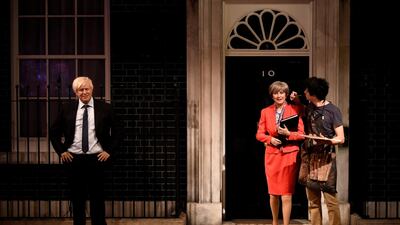Back in 2009, Britain was a different country. True, we were facing the problems of the financial crisis. But in the words of the then opposition leader David Cameron at his party conference, “we are all in this together". He promised that “if we pull together, come together, work together – we will get through this together". Mr Cameron claimed Britain’s economy, politics and society were “broken”.
A year later, he became prime minister. Despite being a decent and likeable fellow, he led the UK into a series of unforced errors – grave mistakes that have come to mean that in many ways, we are worse off than we were. We have not "come together". Quite the opposite.

Competing nationalisms in Scotland and England mean that the future for the UK will be very tricky to navigate. Scotland's First Minister Nicola Sturgeon says that Prime Minister Boris Johnson has a mandate to take England out of the EU – but no mandate to do the same for Scotland. She wants another vote on Scottish independence.
Then there is Westminster politics. The new Labour leader Keir Starmer is off to a good start after the years of division within the opposition party under his predecessor, Jeremy Corbyn. But you might expect when faced with the common threat of coronavirus, while everyone wants Mr Johnson's government to keep people safe, help the sick and stop the deaths, the "coming together" is again coming apart.
Coronavirus is not an equal-opportunity killer.
After 10 years of Conservative-led governments under Mr Cameron, Theresa May and now Mr Johnson, people with coronavirus in the country's poorest areas are dying at twice the rate of people in the richest areas. People of colour, most notably among our extraordinarily brave health workers, are dying at a much greater rate than white people in the same jobs.
BAME health workers who sacrificed their lives








The Office for National Statistics, or ONS – Britain's most trusted source of facts and figures – reckons there are about 55.1 deaths per 100,000 citizens in the most deprived tenth of England, whereas the figures in the least deprived tenth are 25.3 deaths in 100,000.
Those from BAME (Black, Asian, Minority Ethnic) backgrounds are significantly over-represented in the mortality figures. Newham – a less well-off area of London with a large BAME population – has reported 144.3 deaths per 100,000. The cities of Liverpool, Birmingham, Wolverhampton and Middlesbrough also have a high death rate with the virus. Of course, people in these cities are living more closely together.

While similar Scottish and Welsh figures are not yet available, it is certainly true that living in the relatively under-populated Scottish highlands or North Wales makes it much less easy for the virus to spread. The ONS data is age-standardised, so age differences are taken into account.
There is nothing new in the idea that poorer people might not live as long as richer people. Some of the areas with a high death rate are very deprived. Poor nutrition, obesity, heart disease, smoking and other factors are undeniably involved. But it is also undeniable that the National Health Service has been under-resourced for years.
In a recent column, I wrote of a report by Professor Michael Marmot – one of Britain's leading experts on health inequalities – who said that over the past decade life expectancy in England has stalled for the first time in 100 years, and among English women living in the poorest communities life expectancy has declined since 2011.
Professor Marmot called it “shocking” that England had “lost a decade” in health care, which – you may think – coincidentally is the decade of Conservative-led governments. The rich-poor life expectancy gap in Britain is a difference of 9.5 years for men and 7.7 years for women.
For the immediate future, Britain needs to bring the death rate down and move towards reinvigorating the economy.












Some in government, overburdened by the many pressures they face, seem to be disturbed by the idea that their efforts are being criticised. They are wrong. An honest debate is essential right now.
Scotland, Wales and Northern Ireland have all made it clear that they are not following entirely in lockstep behind Mr Johnson’s government, which many commentators and medical experts say was complacent, under-prepared and slow to understand the nature of the coronavirus threat.
For the medium term, we need to get back to something we might call “normal” – although what that will be, no one can say. And for the longer term, we as a nation need to take a long hard look in the mirror.
The rhetoric of being “all in this together” has been a convenient piece of political nonsense. Some of us are more “in it” than others. Death is a great leveller. Maybe our opportunities should be more level too. Rich, poor, white, people of colour, are all equally irreplaceable.
What we need is a new social contract involving governments, businesses and people to recognise in reality – and not just in glib political phrases – that we are all truly in this together.
Gavin Esler is a journalist, author and presenter


